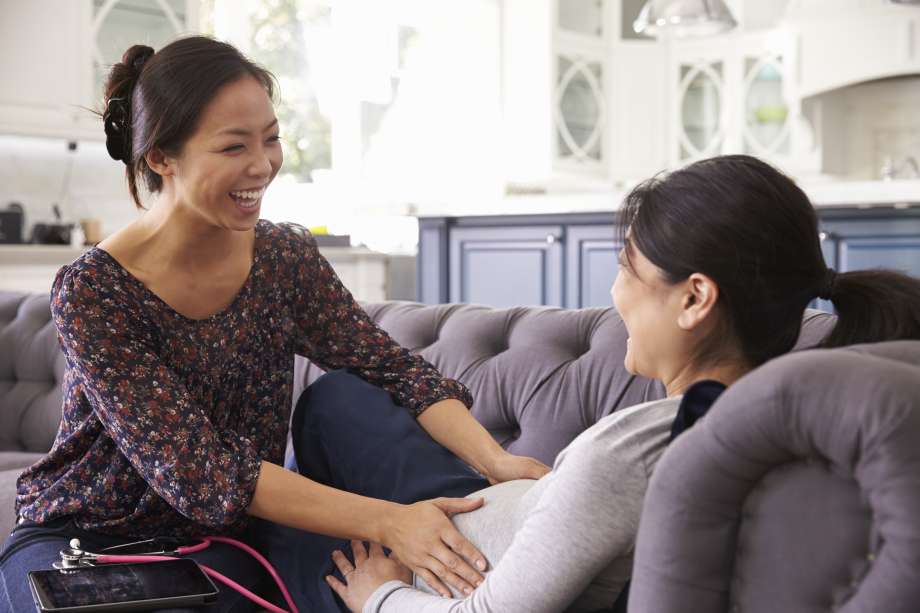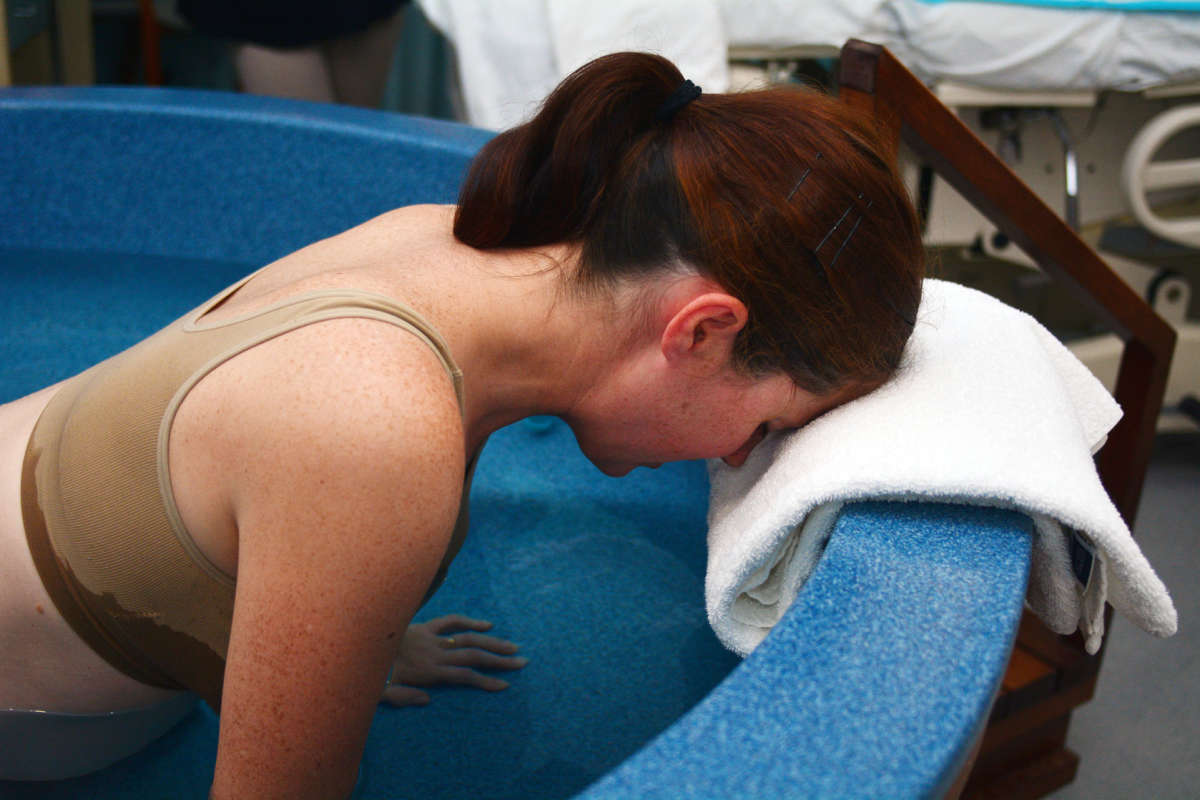What's the Difference Between Doulas, Midwives and Doctors?

You have to make so many decisions when pregnant, from deciding what to do about work, to selecting a doctor, to, of course, choosing a baby name.
One decision every expectant mommy makes, whether they’re having Baby 1 or Baby 5, is who they want with them on their journey through pregnancy, and at the birth. (Besides their partner, of course.)
Do you want a doula? A midwife? Or the OB-GYN? There’s no right or wrong answer, it’s your choice; but it’s nice to have options on delivery day.
Here’s a quick guide on the differences between these three and how they help deliver your baby--and beyond.

Birth Story: A Natural Home Birth
Find from someone who's been there what it's like to give birth naturally at home.
Learn MoreLearn More
What’s a DO?
An OB-GYN (obstetrician-gynecologist), is a doctor who specializes in women’s health; from menstruation through menopause. They also do preventative screenings, such as for breast or uterine cancer.
And, of course, they provide prenatal and post-partum care. Remember: Not all OB-GYN’s deliver babies though, so confirm if yours does, or ask if they have a doctor on staff who does deliver.
If your OB-GYN is a DO (Doctor of Osteopathy) what does that mean? “Both MDs and DOs attend traditional medical schools and complete medical residency training,” explains ProMedica Physician Brittany Denny, DO. “Osteopathic training is centered in the philosophy that it is the physician’s duty to facilitate the body’s innate ability to heal itself. We achieve this by providing medical care that is holistic, patient-centered and addresses the mind, body, and soul.”
MDs and DOs hold the same medical license and practice privileges; in fact, says Denny, patients may not notice obvious differences in their care.
Doula Duties
“The presence of this kind of support has been shown in research to shorten labor time and decrease the incidence of cesarean section.”
-- Brittany Denny, DO.
A doula provides one-on-one labor support to a mother, explains Denny. But they do NOT deliver babies.
“We’re a ‘sounding board,’ and help you solidify a birth vision, point you to evidence-based information and help facilitate communication with your care providers both during your prenatal visits and in the hospital during your birth,” says Kaitlin McGreyes, a Long Island, NY-based doula.
When labor starts, explains McGreyes, a doula joins you and helps you and your partner get the information they need to stay calm and present to support you as you labor.
“With a doula supporting you, there is usually more intimacy between a birthing woman and her partner, not less. When it’s time to transition to the hospital, we help the birthing couple relay their birth plans to the staff, help them get the information they need to feel confident in their choices and all the while preserve the precious space—literally and figuratively—around the mom-to-be that allows her to do the work of birth.”
Adds McGreyes: “With a doula, a woman can birth confidently and feel in control and like she has a voice in her care.”
Do You Need a Doula?
“I don't believe every expectant parent/family needs a doula, however, I do believe they need support; be that from a sibling or friend or doula, and so forth,” says Queens, NY-based doula Chana Topek Diamond.
“Labor and birth is hard, pregnancy is hard, the post-partum period is hard...we are not designed to do any of it alone. I also believe that everyone needs education. We don't learn enough about any of this stuff until it's right in our laps, and we need to be educated.”
The number one thing moms should look for in a doula, says Diamond, is connection. “It doesn't matter how many births a doula has been to, or how many years they've been practicing, or which celebrities they have massaged. If you feel a connection to them and can imagine laughing with them, yelling in front of them, letting them wipe your vomit, rub your back, hold your water straw—that's who you should hire.”
Doula Misconceptions
The biggest misconception about doulas, says Diamond, “is that we want everyone to have a non-medicated birth in the forest surrounded by women wearing crystals and playing tambourines—ha! We support everyone and every type of birth: medicated, non-medicated, first baby, fifth baby, home, hospital, inductions, cesareans and everything in-between.”
Midwives: An Explanation

According to Denny, a midwife is a licensed medical professional who provides labor support and is able to perform uncomplicated (low-risk) vaginal deliveries.
“They work with collaborating physicians, who might be needed if the situation becomes more complicated.”
Beth Helme-Smith MS, CNM, is an Amita Health nurse midwife based in Hinsdale, IL.
“Certified nurse-midwives are registered nurses who have graduated from a nurse-midwifery education program accredited by the Accreditation Commission for Midwifery Education (ACME) and have passed a national certification examination to receive the professional designation of certified nurse-midwife,” she explains. “CNMs provide full scope obstetrical and gynecologic care and family planning services to women.”
The Midwife-Doctor Connection
The responsibilities and certifications of midwives varies by state, so do some research on which type of midwife you want to work with, and ask about credentials.
When CNM’s work with a collaborative OB-GYN, “these are close relationships built on trust and mutual respect. There are specific outlined situations that designate whether a patient requires medical consultation, co-management or referral to the physician for them to take over management of a particular condition,” says Helme-Smith, who works in a practice with OB-GYNs. “Most certified nurse midwives do not do homebirths.”
She adds: “In some cases, the physician may manage the specific medical condition, like hypothyroidism or gestational diabetes, while CNM manages the prenatal care. In other instances, the physician may take over care of the patient if [the mother] requires operative delivery or care that is beyond the scope of the CNMs.”
Home-Birth Midwives: What to Know
Karly Nuttall (LM) is a San Diego, CA-based midwife and hormone specialist. She does home births, and thus, doesn’t work in tandem with doctors.
Expectant mothers who are planning a home birth, she says, should still maintain prenatal visits with an OB-GYN.
“Prenatal visits for home births are not only a source of education for our patients, but also a screening to make sure they are low-risk,” she explains. “If any patient has blood pressure issues, or blood tests that show things like anemia or gestational diabetes—they can risk out of being a home birth candidate.”
Pre-screenings also determine if a mom-to-be is safe to stay under Nuttall’s care, or if they should they see a physician.
During labor, Nuttall also does vitals and assesses things continuously to make sure laboring women are still good candidates to continue with home birth, or if they need to be transferred to a doctor.
Finding the Right Midwife
Nuttall says to make sure that your midwife will transfer you to a doctor if necessary and at an appropriate time. Make sure she has enough experience and skill to make you feel safe and to act when needed.

A Birth Story: Water Birth
Find out from someone who's done it exactly what it's like to have a water birth.
Learn MoreLearn More
“A decent rapport with the nearby hospital is also helpful,” she says. “I recommend you find someone you can connect with and have a cup of coffee with . . . find someone that will give you the amount of care you are looking for.”
For example, Nuttall points says, not all home-birth midwives stay with you through a hospital stay if you transfer, so that's a question to ask. “When the midwife arrives at the home during labor is also important. Also, get a feeling for any additional training or certification that they have (IBCLC, acupuncture, nutritional counseling.”
Adds Helme-Smith, about certified nurse midwives: “I really encourage moms to inquire whether the provider carries malpractice/liability insurance; this should be asked at the first meeting. Certified nurse midwives carry the same level of insurance as physicians.”

